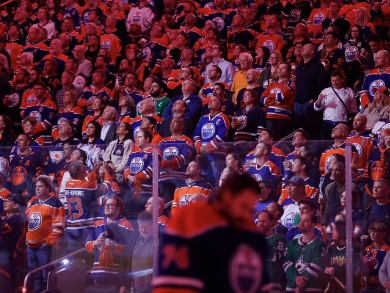In a world where sports unite fans from all walks of life, the recent incident involving an Edmonton Oilers fan has sparked intense debate and controversy. The “Oilers Fan Flash not censored” became a viral sensation, capturing attention for all the wrong reasons. What was supposed to be an exciting night at Rogers Place turned into a moment that would echo across social media platforms and beyond. As fans cheered on their team, one individual’s actions led to discussions about respect, boundaries, and what it truly means to be part of the sports community. Buckle up as we dive deep into this controversial event that has everyone talking—the “Oilers Fan Flash” like you’ve never seen before!
What Happened: A Breakdown of the Event
During a recent Edmonton Oilers game, an unexpected incident caught the attention of both fans and media alike. An enthusiastic supporter decided to flash her chest at a live camera feed, prompting gasps and laughter throughout the arena.
This spontaneous act quickly became viral content. Fans in attendance whipped out their phones, capturing every moment. Social media platforms exploded with reactions—some found it humorous while others deemed it inappropriate.
The event occurred during a critical part of the game when tensions were high. Many spectators were focused on the action unfolding on ice; however, this distraction shifted everyone’s gaze toward the fan’s bold move instead.
As clips circulated online, discussions ignited about boundaries in sports fandom and how far is too far for entertainment purposes. The implications reached beyond just one instance; they opened up conversations surrounding respect and decorum within sports culture.
The Social Media Fallout and Public Backlash
The Edmonton Oilers fan flash incident ignited a storm across social media platforms. Videos and images spread like wildfire, drawing both shock and outrage from users around the globe.
Many took to Twitter and Instagram to voice their disapproval. Hashtags related to the event trended almost immediately, fueling discussions about consent and respect in sports settings.
Public figures chimed in too, amplifying the call for accountability among fans. Comments ranged from disbelief at such behavior to passionate pleas for change within sports culture.
Memes emerged as people reacted with humor or disbelief, but many critiques highlighted a deeper issue: the normalization of objectification in sporting environments. The online discourse turned into a battleground where opinions clashed fiercely—some defended free expression while others insisted on prioritizing respect for all attendees.
This backlash has illuminated an urgent need for dialogue surrounding fan conduct at events.
Responses from the Edmonton Oilers Organization
The Edmonton Oilers organization faced significant pressure to respond to the fan flash incident. Their initial silence sparked further outrage among fans and commentators alike. Many believed that a swift reaction was necessary to address the inappropriate behavior witnessed during a game.
Eventually, the team released a statement emphasizing its commitment to creating an inclusive and respectful environment at games. They condemned any actions that detracted from the spirit of sportsmanship. The organization also encouraged fans to uphold positive values while attending events.
Community engagement became a focal point for their response strategy. The Oilers began collaborating with local groups advocating against objectification and harassment in sports settings. This approach aimed not only to address the immediate issue but also foster long-term change within their fan culture.
The Broader Issue: Objectification of Women in Sports
The objectification of women in sports is a pervasive issue that extends far beyond isolated incidents. It reflects broader societal attitudes toward female athletes, often reducing their achievements to mere aesthetics rather than recognizing their skills and hard work.
Media portrayals frequently focus on appearance rather than athletic prowess. This not only undermines the accomplishments of female players but also sets unrealistic standards for young girls aspiring to enter sports.
Moreover, fan culture can amplify this problem. Instances like the Oilers fan flash incident illustrate how some individuals may feel entitled to treat women as objects of entertainment instead of respected participants in the sporting community.
Addressing these issues requires a collective effort from fans, organizations, and media alike. By shifting our focus towards celebrating talent and dedication, we can foster an environment where every athlete is valued for their contributions—regardless of gender.
Fan Culture and Responsibility in Professional Sports
Fan culture has a profound impact on the atmosphere of professional sports. Fans are the lifeblood of any team, but with that enthusiasm comes a shared responsibility.
When fans attend games, they become part of a larger community. Their behavior sets the tone for others around them. This influence can be positive or negative.
Respecting fellow attendees is crucial. Everyone deserves to enjoy the game without fear of harassment or judgment. Inappropriate actions tarnish not just individual reputations but also reflect poorly on fan bases as a whole.
Moreover, players and staff watch how fans react to events both on and off the field. Understanding this dynamic can promote healthier interactions among all parties involved in sports.
Fostering an inclusive environment benefits everyone—players, families, and loyal supporters alike.
Conclusion: Moving Forward and Creating a More Respectful Environment for Fans and Athletes Alike
The events surrounding the “Oilers fan flash not censored” incident have sparked critical conversations about respect and accountability in sports culture. Fans need to recognize their role in shaping an environment that honors both players and fellow spectators.
Addressing objectification and inappropriate behavior is crucial for fostering a welcoming atmosphere at games. By promoting respectful interactions, organizations can create spaces where everyone feels safe and valued.
As fans, it’s essential to hold each other accountable while supporting your teams passionately. This moment serves as a reminder of the collective responsibility we share—creating a community built on respect, integrity, and understanding toward all participants involved in sports.
Moving forward means embracing these discussions openly while encouraging positive behaviors that uplift rather than undermine the spirit of sport itself.
